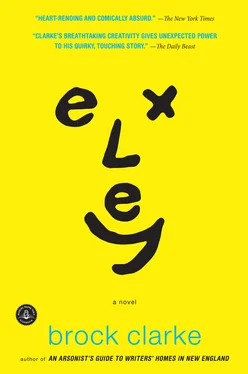“My dad and I think it’s the best book that’s ever been written,” I said. “We love it.”
“This fuckin’ thing?” he said. I could tell he was embarrassed, but in a good way. “This”—and he looked at the page he’d opened to and read—“‘record of yesterday’s monstrous deceptions, betrayals, and obscenities’?”
“Yes,” I said. Then I hugged him. I had to; I couldn’t stop myself. And Exley let me do it; he let me. He might even have hugged me back a little. “Yes, that’s it,” I told him. “That’s the one we love.”
Doctor’s Notes (Entry 24)
When I return home, do I think of the fool I made of myself in front of M.’s mother, or the fool she made of me? Do I fret about whether she recognized me, whether she has spotted the mental health professional through my nicotine-stained beard, my Exleyed manner of dress and address? Do I wonder whether my way of acting like Exley might have acted is even more pathetic than my usual ways of acting like myself? Do I wonder what M. will say to his mother when she returns home? I do not. All I can do is think of how M.’s mother looked, standing in that room. She looked. well, I cannot accurately describe how she looked. Perhaps a writer might be able to do justice to her beauty; perhaps Exley would be able to describe her, although more likely he would make a profanation out of the description. No, I can’t describe what she looked like, but I can describe what I thought when I saw her. Notes, I thought, This really must be love: to remember exactly what one is thinking when one falls in love . When I first spotted M.’s mother in that room, I addressed myself mentally: You can’t really think you have a chance with her. Every other man in this place is like you. Every other man here thinks she’s beautiful, too . And then I thought, Oh, lucky day: there are no other men here. There are only M. and you. The rest are women .
Women , I think. And then I think, Men . And then I run over to my desk. I lift you, Notes, and underneath I find the manila envelope containing the three letters that purport to be to M. from M.’s father, and also the newspaper notice of the ceremony earlier today on the Public Square. I take out the newspaper clipping. I read it. I read the name of the dead soldier. I light a Pall Mall and read the name again. The name is Army Captain K.R. The captain is a man. And his first name is K.
“You fool,” I think and also say. I throw on my lined flannel shirt, put the newspaper clipping back in the envelope and the envelope in my breast pocket, and sprint through the snow back to the YWCA. It is nearly an hour after M. and I left the building, but I can see M.’s mother standing in the ballroom, speaking to a couple of stragglers. I wait until M.’s mother emerges from the building. It is snowing again, the flakes gently drifting down in the streetlights until they land and melt in her black, black hair. The beloved never looks so beautiful as in the moment before she is about to stop being the beloved. I have so many things to say to and ask M.’s mother, but all I can think to say when she sees me standing on the sidewalk, gawking at her, is, “Oh my lord, Mrs. L.R.”
She blushes and says, “Please call me C.” Then she takes a long look at me and says, “Wow, so that was you in there.”
I feel the heat rushing to my face, because I think she’s mistaken me for Exley. “No,” I say. “It’s just me. M.’s doctor.”
“I know that’s who you are,” she says, frowning. “You just look different.”
“It’s the beard,” I say.
“That’s part of it,” she says, still frowning. “I thought I asked you not to come to the lecture tonight.”
“I know,” I say. “But I couldn’t help myself.” I pause, thinking of what I should say next. “You were very impressive,” I say, but she ignores the compliment.
“Why did you bring M.?” she wants to know. “Is this part of his treatment?”
Yes , I almost say, but then I think, No. No more lies . “No,” I say. “He came because I wanted to go. If I hadn’t gone, he wouldn’t have, either.”
M.’s mother nods at this and then asks, “Who did you think I was talking about?”
“When?”
“Earlier. When I said, ‘Wow, so that was you in there,’ and you said, ‘No. It’s just me. M.’s doctor.’ Who’d you think I was talking about?”
“Frederick Exley,” I say.
M.’s mother’s frown deepens and turns into something else, something more permanent seeming. “Why would I think you were him ?”
“Because M. does,” I say.
“Why does M. think that?”
“Because he wants to,” I say. “Because I let him. Because he thinks his dad is in the VA hospital and the only way to save him is if he finds Exley and brings him to his dad.”
We both stand there and watch as a snowplow makes a scraping, shooshing lap around the Square and then heads south on Washington. After that, the Square is quiet. There is nothing as quiet as nighttime Watertown after a plow has passed through and it’s still snowing. There’s nothing as quiet as that moment before one person is about to tell another something neither of them wants to hear.
“I saw you here this morning,” I say.
“Where?”
“Right here,” I say. “On the Square.”
“What do you mean?” she says.
For Christ’s sake, C., cut the shit, will ya ? is what I want to say. But these are Exley’s words, or close to them, and I know those are exactly the wrong words to use with M.’s mother. So instead, I don’t say anything. I simply reach into my pocket, take out the manila envelope, take the newspaper clipping out of the envelope, and hand it to her. She reads it for a long, long time — far longer than the quantity of text warrants.
“Oh, C.,” I say. Because for the first time, she is no longer M.’s mother to me. She is herself. Apparently, you become yourself to someone when that someone finally learns your secrets. “Tell me what you’ve been up to.”
“I can’t,” she says, still looking at the clipping. This is a familiar moment for a mental health professional. To be a mental health professional, you have to know when patients are incapable of speaking for themselves, and when that happens, you have to know how to speak for them. There is enough residual mental health professional in me to know that this is one of those times.
“He was K., wasn’t he,” I say. “M. thinks his dad was having an affair with a woman named K. because that’s something Exley might have done. But M.’s dad wasn’t. You were having an affair with a man named K.”
C. nods, still looking at the clipping.
“And he was a soldier,” I say. “And he died in Iraq. You found out on Sunday. That’s why M. found you crying in the bathroom.”
“K. was in the reserves,” C. says. “He was the other lawyer in my office before they called him up.”
I can hear something in her voice, something that tells me she still loves him. The way I want her to love me. The way I love her. The way M.’s dad and K. probably loved her, too, even though they were cruel to her. The way I’m about to be cruel to her as well. And why? Why does love let us be so cruel to the beloved?
“And he was married,” I say.
“Stop it,” C. says.
“And he told you he would leave his wife for you.”
“Please stop it,” C. says.
“But he didn’t.”
“Fine,” she says, finally looking up at me. And I know immediately that I’ve gone too far. And I also know that this is why love allows us to be so cruel to the beloved: so that the beloved doesn’t make the mistake of loving us again or loving us for the first time. “You want me to fucking say it?”
Читать дальше












